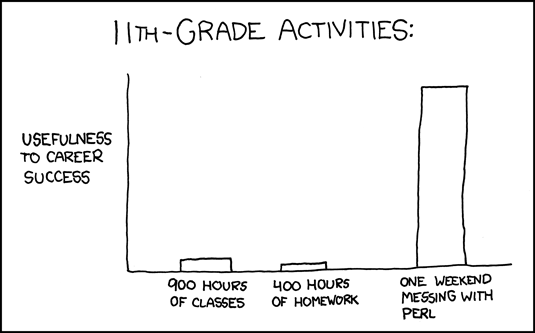Feyman on Computers
Over at In the Dark, Peter Coles has been quoting Richard Feynman on various topics (and Feynman had a lot to say on a lot of topics, much of it quite eye-opening). One of his recent quotes was the following (which I creatively copied - i.e. pinched - directly from Peter's blog);
Unfortunately, I already knew I had the disease Feynman talks about. Back in the early 1980s (I think it was 1982), I remember trundling on the bus to Swansea to spend almost £100 on a ZX81 and 16k RAM pack (on which the slightest breath would delete everything). Just for nostalgia sake;
While there were games available to buy (on cassette tape, which you could actually listen to as they loaded), they weren't too cheap. To make up for this, there was a number of magazines that published game source code (in Sinclair BASIC) which you could type in and play.
Games often weren't much cop, with basic graphics and game play - below is one you actually bought
and often when typing in the source code, there would often be a bug that you introduced, or a bug in the actual source code. To make the games work, you had to understand what the code was actually doing, such as mucking about with memory with peeks and pokes, and, even though I didn't realise it at the time, you had to learn how to debug code. Learning these skills helped me play around, write my own code, and actually start to use it. Again, I remember writing a code adding wave after wave to show that you could make a square wave, and this was before I was formally introduced to Fourier analysis.
OK, time for grumpy old man time. I'm told that the current generation of students coming into universities these days are computer-literate, having grown up with computers. While this is true, it is clear that many students have never played with computers in the sense of Feynman's statement. Web searching, email and Facebook just don't cut it.
Does it matter? If you want to do a degree in physics, both undergraduate and graduate, I think you need these skills. Many (most) research projects will require students to integrate/differentiate functions, find correlations, fit models to data etc etc, and I see students struggle having to learn these concepts from scratch. This is made worse as many students shun computational physics courses when doing their degree (probably because they don't realise how important these skills are).
I'll leave the final word to the wonderful Randall Munroe and xkcd. While it was BASIC for me, rather than PERL, I very much agree.
I remember reading this in Feynman's excellent book Surely You're Joking Mr Feynman, a book I read about the time I decided not to be a particle physicist and to be a astrophysicist instead. But I remember that when I originally read this quote, I *think* I misunderstood what it was saying. I think it was saying that "if you use computers, don't waste your time playing around with them".Well, Mr. Frankel, who started this program, began to suffer from the computer disease that anybody who works with computers now knows about. It’s a very serious disease and it interferes completely with the work. The trouble with computers is you *play* with them. They are so wonderful. You have these switches – if it’s an even number you do this, if it’s an odd number you do that – and pretty soon you can do more and more elaborate things if you are clever enough, on one machine.After a while the whole system broke down. Frankel wasn’t paying any attention; he wasn’t supervising anybody. The system was going very, very slowly – while he was sitting in a room figuring out how to make one tabulator automatically print arc-tangent X, and then it would start and it would print columns and then bitsi, bitsi, bitsi, and calculate the arc-tangent automatically by integrating as it went along and make a whole table in one operation.Absolutely useless. We *had* tables of arc-tangents. But if you’ve ever worked with computers, you understand the disease – the *delight* in being able to see how much you can do. But he got the disease for the first time, the poor fellow who invented the thing.
Unfortunately, I already knew I had the disease Feynman talks about. Back in the early 1980s (I think it was 1982), I remember trundling on the bus to Swansea to spend almost £100 on a ZX81 and 16k RAM pack (on which the slightest breath would delete everything). Just for nostalgia sake;
While there were games available to buy (on cassette tape, which you could actually listen to as they loaded), they weren't too cheap. To make up for this, there was a number of magazines that published game source code (in Sinclair BASIC) which you could type in and play.
Games often weren't much cop, with basic graphics and game play - below is one you actually bought
and often when typing in the source code, there would often be a bug that you introduced, or a bug in the actual source code. To make the games work, you had to understand what the code was actually doing, such as mucking about with memory with peeks and pokes, and, even though I didn't realise it at the time, you had to learn how to debug code. Learning these skills helped me play around, write my own code, and actually start to use it. Again, I remember writing a code adding wave after wave to show that you could make a square wave, and this was before I was formally introduced to Fourier analysis.
OK, time for grumpy old man time. I'm told that the current generation of students coming into universities these days are computer-literate, having grown up with computers. While this is true, it is clear that many students have never played with computers in the sense of Feynman's statement. Web searching, email and Facebook just don't cut it.
Does it matter? If you want to do a degree in physics, both undergraduate and graduate, I think you need these skills. Many (most) research projects will require students to integrate/differentiate functions, find correlations, fit models to data etc etc, and I see students struggle having to learn these concepts from scratch. This is made worse as many students shun computational physics courses when doing their degree (probably because they don't realise how important these skills are).
I'll leave the final word to the wonderful Randall Munroe and xkcd. While it was BASIC for me, rather than PERL, I very much agree.




Very Nice Blog
ReplyDeleteElectronic Waste Management in India
e waste recycling in india
electronic scrap buyers in India